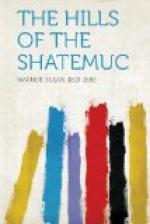The snow melted from off the hills, and the winter blasts came more fitfully, and were changed for soft south airs between times. There was an end to dressing flax. The spring work was opening; and Winthrop had enough to do without working on his own score. Then Mr. Landholm came home; and the energies of both the one and the other were fully taxed, at the plough and the harrow, in the barnyard and in the forest, where in all the want of Rufus made a great gap. Mrs. Landholm had more reason now to distress herself, and distressed herself accordingly, but it was of no use. Winthrop wrought early and late, and threw himself into the gap with a desperate ardour that meant — his mother knew what.
They all wrought cheerfully and with good heart, for they were together again; and the missing one was only thought of as a stimulus to exertion, or its reward. Letters came from Rufus, which were read and read, and though not much talked about, secretly served the whole family for dessert at their dinner and for sweetmeats to their tea. Letters which shewed that the father’s end was gaining, that the son’s purpose was accomplishing; Rufus would be a man! They were not very frequent, for they avoided the post-office to save expense, and came by a chance hand now and then; — “Favoured by Mr. Upshur,” — or, “By Uncle Absalom.” They were written on great uncouth sheets of letter-paper, yellow and coarse; but the handwriting grew bold and firm, and the words and the thoughts were changing faster yet, from the rude and narrow mind of the boy, to the polish and the spread of knowledge. Perhaps the letters might be boyish yet, in another contrast; but the home circle could not see it; and if they could, certainly the change already made was so swift as shewed a great readiness for more. Mr. Landholm said little about these letters; read them sometimes to Mr. Upshur, read them many times to himself; and for his family, his face at those times was comment enough.
“Well! —” he said one day, as he folded up one of the uncouth great sheets and laid it on the table, — “the man that could write that, was never made to hoe corn — that’s certain.”
Winthrop heard it.
At midsummer Rufus came home for a little. He brought news. He had got into the good graces of an uncle, a brother of his father’s, who lived at Little River, a town in the interior, forty miles off. This gentleman, himself a farmer extremely well to do in the world, and with a small family, had invited Rufus to come to his house and carry on his studies there. The invitation was pressed, and accepted, as it would be the means of a great saving of outlay; and Rufus came home in the interval to see them all, and refit himself for the winter campaign.




